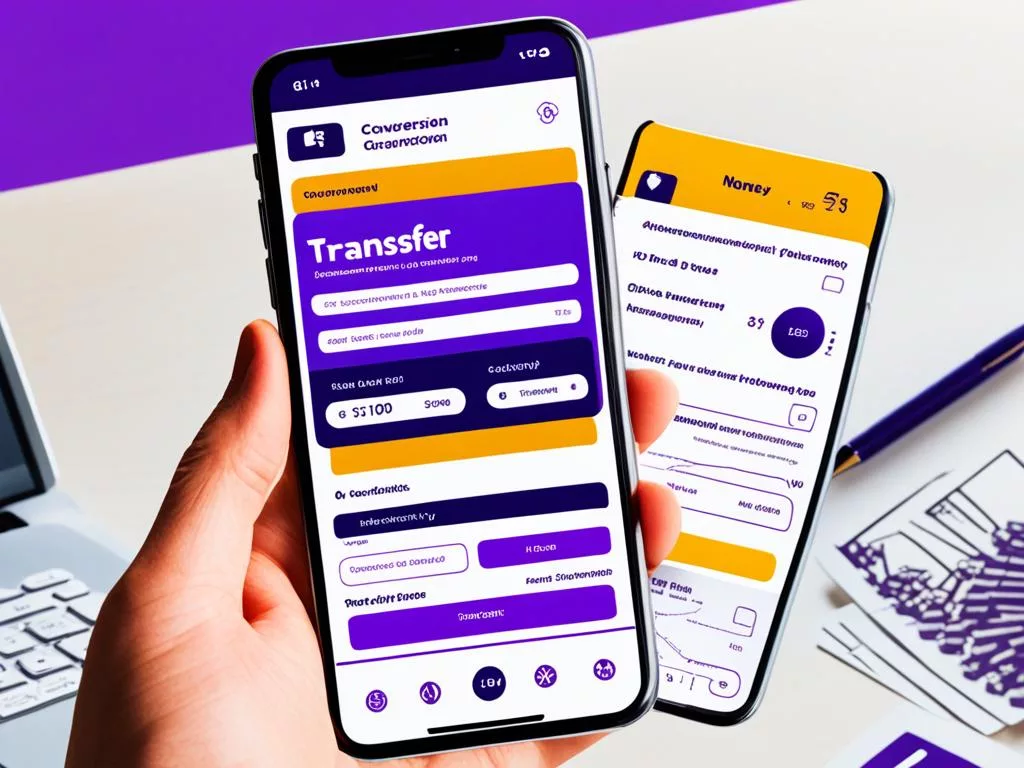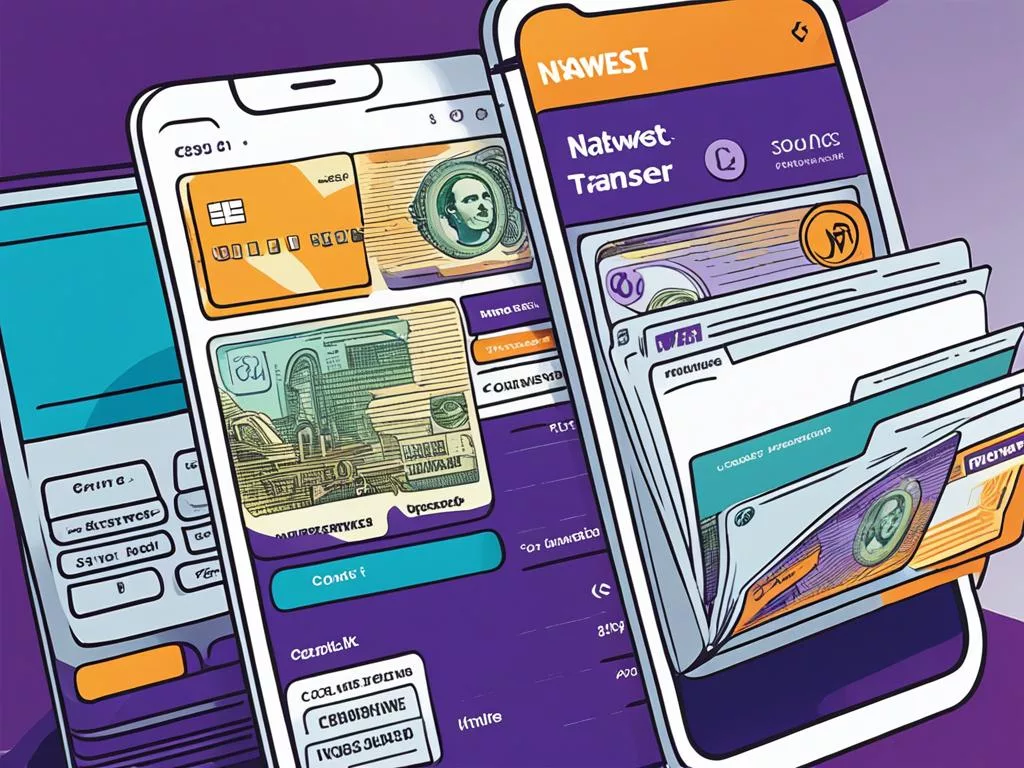Learning that the British government owns 35% of NatWest Group after a £45 billion bailout in 20081 changes how we see banking stability and government backing. NatWest stands out in the banking world, with its rich history and large presence. It has over 960 branches and 7.5 million personal customers in Great Britain, showing its big role in the banking scene1.
For international transfers, NatWest brings customers into a digital, easy world with no fees for standard online transactions1. Yet, the foreign exchange rates at NatWest might surprise some customers. These rates can add up to 3% to 5% more on the total cost of a currency transfer1.
In global finance, balancing costs and convenience is crucial. Knowing all about the fees, exchange rates, and past events can help you make smart decisions and avoid expensive mistakes. Let’s explore what this well-established bank offers and see if it stands strong in the tough market of money transfers today.
The Intricacies of NatWest’s International Money Transfer Services
Exploring international finance opens our eyes to the costs of using services like NatWest’s money transfers. There are two main costs to look at: the clear-cut bank fees and the less clear exchange rates. Both types of fees affect how much you end up paying, which makes understanding them crucial.
NatWest encourages online transfers by not charging a fee for standard ones. But, if a transfer is urgent, you’ll pay a fee. This shows how going digital with NatWest can save you money on these services.
- Standard Online Transfer – No Fee
- Urgent Online Transfer – Applicable Fee
- Phone or In-Branch Transfer – Higher Fee
The exchange rate margin is a hidden cost we need to watch out for. Since NatWest doesn’t always tell us this rate upfront, it’s harder to compare their service to others. This hidden margin is often how banks, including NatWest, make extra money.
| Currency Type | Transfer Fee | Exchange Rate Margin |
|---|---|---|
| Euro Transfers | Lower fees or no fees for online transfers | Not disclosed upfront |
| Non-Euro Transfers | Typically higher fees | Not disclosed upfront |
So, even though NatWest’s fees might seem straightforward, the real cost involves the exchange rates. Being careful and seeking clarity on these rates is key. Only by doing this can we figure out the true cost of transferring money abroad with NatWest.
Is NatWest the Best Choice for Global Bank Transfers?
Searching for the best way to send money across borders, I’ve looked into many options. NatWest caught my attention with its huge reach and millions of users. But, is it the top pick for sending money worldwide? That’s up for debate.

Recently, the British pound’s value fell sharply. This change makes sending money abroad more complex.2 Providers like UKForex and TransferWise often beat NatWest in value. For example, TransferWise gives you more dollars for your pounds than NatWest does.
Yet, NatWest’s merger with The Royal Bank of Scotland isn’t something to ignore. This merge made them even bigger. Meanwhile, companies like CaxtonFX and HiFX are getting noticed for offering better rates than most banks.
NatWest is trying to keep up by going digital. They’re facing stiff competition from newcomers like TransferWise and CurrencyFair. CurrencyFair’s low fees could be a better deal than what banks typically charge.
Even with NatWest’s large network and many customers, their rates for moving money might not be the best. The lack of clear rates for mid-sized transfers and a big fine for regulatory lapses raise concerns.
After checking everything out, it seems NatWest is strong but might not have the best conditions for moving money internationally. The key could be finding the right mix of good rates from brokers and the trustworthiness of big banks.
Review of NatWest for Foreign Exchange and Transferring Money Internationally
My look into NatWest’s foreign exchange service shows it struggles in a shaky currency market and tough competition. With the pound’s drop against the euro and dollar
When comparing international money transfers, exchange rate margins matter a lot. NatWest’s margins of 3-5% are okay for small amounts. But, these fees grow for bigger transfers, showing NatWest’s rates might not be as good as they seem. For instance, transferring £100,000 with a 5% margin means paying an extra £5,000, which is a lot for the customer.
NatWest’s admission of not properly checking for money laundering between 2012 and 2016 raises more concerns, with £365 million deposited and £264 million in cash. This might lower trust in NatWest, especially when others, like MoneyCorp and HiFX
Let’s make things clearer by comparing different transfers across various providers in a table:
| Transfer Amount (£) | Best Provider | Best for Euros (£) | Best for Dollars (£) |
|---|---|---|---|
| 200 | UKForex | UKForex | TransferWise |
| 2,000 | The Currency Account | The Currency Account | TransferWise |
| 150,000 | The Currency Account | The Currency Account | HiFX |
Clearly, for a £200 transfer, NatWest lags behind UKForex for euros and TransferWise for dollars. The gap widens with a £2,000 transfer, where NatWest is outdone by services like PayPal for euros and falls short for dollars
So, ending this part of my review, I advise those thinking about using NatWest for foreign exchange to look closely. There are other services outperforming NatWest, offering better value and service for international transfers. This could mean a more beneficial deal for clients moving money across borders.
Understanding Transfer Times and Limits at NatWest

When you’re looking at NatWest for overseas transfers, it’s important to know their NatWest transfer time. If you’re a global citizen or a sharp businessman, you’ll find it useful to know transfers usually take 2 – 4 working days. Urgent transfers are faster, happening in just 1 – 2 working days for an extra fee3. But, when we talk about international transfer limits, there’s a daily cap of £10,000 for online transactions. This might not fit big deals, like buying property1.
If you need to move more than that, NatWest’s ‘Markets Team’ helps with amounts over £250,000. However, details on this special service are limited. This leaves a support gap for transfers between £10,000 and £250,000. It makes you wonder if NatWest can truly support regular large-scale international transfers1.
The introduction of SEPA NatWest payments has made things smoother for those in the SEPA region. These payments are processed the same day. It shows how committed NatWest is to fast and efficient European banking1.
| Service | Transfer Time | Limit | Service Availability |
|---|---|---|---|
| Standard International Transfer | 2 – 4 working days | Up to £10,000 daily online | Global |
| Urgent International Transfer | 1 – 2 working days | Up to £10,000 daily online | Global |
| SEPA Payments | Same day | N/A | European countries within SEPA |
| Markets Team Service | Varies | Over £250,000 | Available upon request |
In conclusion, NatWest’s SEPA transactions and £10,000 daily limit for online transfers are handy. But, smart customers will think about the need for higher limits and clearer processes for big moves. This is key for big personal or business financial moves1.
A Look at NatWest’s International Transfer Costs Against Competitors
When thinking about sending money abroad, comparing options is crucial for getting the best deal. I’ve looked at NatWest and other services like Wise, Western Union, and OFX. This can help anyone looking for smart, low-cost ways to move their money internationally.
Each provider has its own benefits, making careful comparison important. NatWest, for example, offers a credit card with a good APR and useful app features for travelers4. But, it’s important to compare these perks against others’ fees.
Many people compare NatWest with Wise because Wise is very open about their fees. They let you use the real mid-market rate for exchange. Wise also has a travel card that lets you spend in 53 currencies. It only charges you after the first two £200 withdrawals4. Compared to traditional banks, this can be a huge saving.
Looking at NatWest and Western Union, Western Union stands out for its vast global reach. This is key for those who need quick access to their money abroad.
Comparing OFX and NatWest shows OFX’s fast service and often lower costs. For big transfers, OFX tends to offer more personalized support, unlike NatWest’s £10,000 daily limit for online transfers1.
NatWest provides solid services without upfront fees for standard payments. However, their hidden costs could make them less appealing. For better rates and quicker service, it’s worth considering specialized transfer services for your international needs.
| Provider | Fee Structure | Exchange Rates | Transfer Speed |
|---|---|---|---|
| NatWest | No upfront fee for standard payments, additional fees possible | Markups applicable | 1-2 working days for urgent transfers |
| Wise | Transparent fees, real mid-market rate | No markups | Varies, often same-day or next-day |
| Western Union | Varies based on transfer options | Varies, often competitive for cash pickup | Minutes to days, depending on service |
| OFX | Potentially lower than banks, no transfer fee on large transfers | Competitive rates, typically better than traditional banks | 1-2 business days |
It’s wise to carefully review all your options. Do a thorough check of fees, rates, and speed before choosing a provider. By spending time on this analysis, you can find great savings and meet your international transfer needs effectively.
The Usability of NatWest’s App for International Transfers
The NatWest app is great for sending money across the globe easily. It matches the rising use of mobile apps for international money transfers. But, it’s not perfect for big amounts that might need expert help.

The app shows NatWest’s strong push towards digital banking. Services like NatWest’s Payit are now easy to use for most UK account holders5. However, for complex deals needing detailed understanding of foreign exchange, seeking professional advice is better.
This tool is a big leap in digital banking, helping countless users. Still, there’s a need for more data on how it handles foreign exchange deals. For big transactions, NatWest’s ‘Markets Team’ is there to help with expert advice.
Doing international transfers with just a smartphone feels simple and quick with this app. Yet, for larger sums, looking into specialized services might be smarter. They could offer better exchange rates, which is crucial for big transfers.
In summary, the NatWest app is handy for regular transfers. But for high-stakes forex transactions, it might not meet the mark for detailed support and tailored service.
When and Why to Choose NatWest for Small and Large Transfers
When looking at transferring money across borders, choosing NatWest bank may come to mind. But it’s wise to compare it with others. The value of the pound has fallen, making the choice of transfer service more important. It’s about finding a mix of good service and exchange rate value.
- For small money transfers, NatWest is a good choice because they don’t charge a fee for online transfers.
- For large money transfers, looking at the total cost is key. Sending £200 through NatWest would get you $229.31. But using TransferWise, you could get $260.942.
- If you’re sending over £150,000, HiFX is noted for better rates, coming out on top in a survey2.
HiFX has moved around £100bn since 19982, showing the value of looking beyond NatWest. TransferWise and CurrencyFair are known for their clear fees. They charge 0.35% of the transfer plus €32.
| Provider | Exchange Rate | Transfer Fee |
|---|---|---|
| NatWest | £200 → $229.312 | No fee for online standard transfers |
| TransferWise | £200 → $260.942 | 0.35% + €32 |
| HiFX | Best for £150,000+2 | Contact for details |
In 2010, the collapse of Crown Currency Exchange affected thousands. Over 3,000 people lost a total of £20m2. Such events highlight why it’s crucial to check a company’s exchange rates, fees, and reliability. The right choice for small and large money transfers depends on these factors.
It’s essential to do your homework before making a transfer. Whether you pick choosing NatWest bank for fee-free transfers or another service with better rates, get a quote. Make sure they fit all your needs. In the ever-changing currency market, an informed choice can make a big difference.
Alternatives to NatWest for International Money Transfers
Looking into money transfer alternatives to NatWest is key for those wanting the best value in international transfers. Studies show traditional banks may not always offer the best deals. With the Pound to Euro exchange rate being less than 1.15 and the Pound to Dollar rate under 1.32, people are choosing currency brokers and payment services providers for better deals.
The fall of Crown Currency Exchange in 2010 left 3,000 people losing a total of £20 million2. A test comparing amounts like £200, £2,000, and £150,000 converted into euros and dollars showed differences; for £200, NatWest gave $229.31, while TransferWise offered $260.942. TransferWise, now Wise, has changed the finance industry since starting their Currency Account in 20142.
HiFX, founded in 1998, has moved about £100 billion, showing a high demand for alternative payment services providers2. Monito’s research shows over seven million comparisons are made each year, with an average fee of about 0.59%6, making the competition tough.
Services like Wise (0.25% – 1.75%), Remitly (0.5% – 2%), and OFX (0.4% – 1%)6 offer a wide range of fees. Consumers have many choices, along with differences in transfer speed and coverage. For instance, Remitly handles transfers with 14 currencies to 47 countries, and OFX from 34 countries to over 1906. This variety helps when sending money to remote places.
Using these currency brokers or payment services providers can be eye-opening. Below, I compare some popular services to NatWest on transfer fees, speed, and reach:
| Service Provider | Transfer Fees Range | Transfer Speed (Business Days) | Coverage (Countries/Currencies) |
|---|---|---|---|
| Wise | 0.25% – 1.75% | 1-2 | Varies |
| Remitly | 0.5% – 2% | 1-3 | 14/47 |
| WorldRemit | 1% – 2.5% | 1-3 | Varies |
| OFX | 0.4% – 1% | 1-5 | 34/190+ |
| NatWest | Exchange Rate Margin* | 1-4 | Varies |
*NatWest’s fees not listed due to varying exchange rate margins
Western Union stands out for low fees on bank transfers at 6%, says Monito6. Doing your research can save money, for personal or business needs.
To sum up, it’s smart to check all options for international money transfers. Fintech options often beat traditional banks in efficiency, cost, and speed. This can bring not just better rates but also peace of mind, especially in urgent times.
Deciphering the True Savings with NatWest’s No Transfer Fee Policy
NatWest has made a bold move by not charging fees for standard international transfers done online or via their app. This is part of their effort to save customers money. However, understanding the entire cost of international money transfers requires more than looking at direct fees.
It’s crucial to realize the real cost often hides in the exchange rate markups. Plus, unseen fees from intermediary banks can also reduce the savings you expect. These hidden charges play a big role in the final amount your recipient gets.
At first, the promise of not paying a transfer fee might seem great. But, looking closer reveals that additional, hidden costs could lessen the benefits. Before using NatWest for international transfers, it’s important to consider all costs.
But fees aren’t the only thing to think about. Following rules and being careful matters too. It’s worth noting that NatWest was involved with big money movements from Fowler Oldfield7. This case shows how important it is for banks to carefully monitor their transactions. Eleven people admitted to being involved with Fowler Oldfield’s deposits7, and thirteen more are waiting for their trial7.
Because of these issues, NatWest was fined over £397 million, later reduced after they admitted guilt7. This was the first time the FCA charged a major UK bank with money laundering crimes7. It’s a reminder that there’s more to bank fees than meets the eye.
Specialist transfer services aim to reduce hidden costs. They often avoid traditional bank routes, cutting down on extra fees. This can make transferring money cheaper and clearer for customers.
To sum up, even if NatWest doesn’t charge transfer fees, knowing about exchange rates and hidden fees is key. Always explore your options and stay informed about all possible costs to really save on international transfers.
Addressing the Convenience Factor of NatWest’s Online Services
NatWest online banking stands out for making international payments easy. You can do transactions anytime, showing how finance is changing. This convenience reflects changes since a Senate Hearing in 2013 on digital currencies. Now, we can easily move through global finance complexities8.
By 2013, people had mined 10 to 12 million bitcoins. This shows digital growth that NatWest’s online services also reflect8. Back then, bitcoins were worth over $700 each. This highlights the importance of reliable online banking for global payments, a need NatWest meets well8.
In discussions on finance’s future, 22 Senators and 5 experts got together8. They talked about new financial possibilities. Likewise, NatWest offers great digital banking tools. These tools let users do more on their own without old-school transaction methods.

A long time ago, experts thought only 5% of Americans would use cell phones by 20128. That guess was way off. Similarly, there’s a chance for NatWest to do even more. They can improve services for people doing big transactions.
NatWest’s online services make paying internationally easy. But, if you’re making big transactions, you might miss having personal help. As a user, you have to decide if digital banking fits your needs when dealing with complex money matters.
The goal is to have 21 million bitcoins eventually. This goal mirrors the endless opportunities in digital banking8. As tech evolves, so does our view of what’s convenient and safe in managing money.
NatWest’s Suitability for Different Types of International Money Transfer Needs
I find that NatWest works well for small and urgent transfers. They offer same-day SEPA transfers at no extra cost, great for fast moves within Europe. But for amounts over £10,000, there are some hurdles due to daily online limits.
People moving large amounts need to look at their options. For transactions above a quarter-million, NatWest’s ‘Markets Team’ steps in to help. But for amounts below this yet over daily online limits, there’s a noticeable gap. This shows why understanding different types of transfers is crucial for your financial goals.
Still, it’s smart to compare NatWest with specialists in international transfers. These experts often offer better rates, faster services, and more personalized support. The growth of digital currencies like Bitcoin, reaching over $700 per unit, highlights the changing world of finance8. This makes it essential for both people and banks to keep up with evolving financial needs.
Source Links
- https://en.wikipedia.org/wiki/NatWest
- https://www.theguardian.com/money/2016/aug/20/send-money-overseas-best-deal-transfer
- https://www.bankofengland.co.uk/payment-and-settlement/chaps
- https://www.thetimes.co.uk/money-mentor/loans-credit-cards/credit-cards/best-credit-cards-abroad
- https://www.natwest.com/business/business-services/payit-hub/payit.html
- https://www.monito.com/en/wiki/what-is-the-cheapest-way-to-send-money-abroad
- https://www.fca.org.uk/news/press-releases/natwest-fined-264.8million-anti-money-laundering-failures
- https://www.govinfo.gov/content/pkg/CHRG-113shrg87095/html/CHRG-113shrg87095.htm

